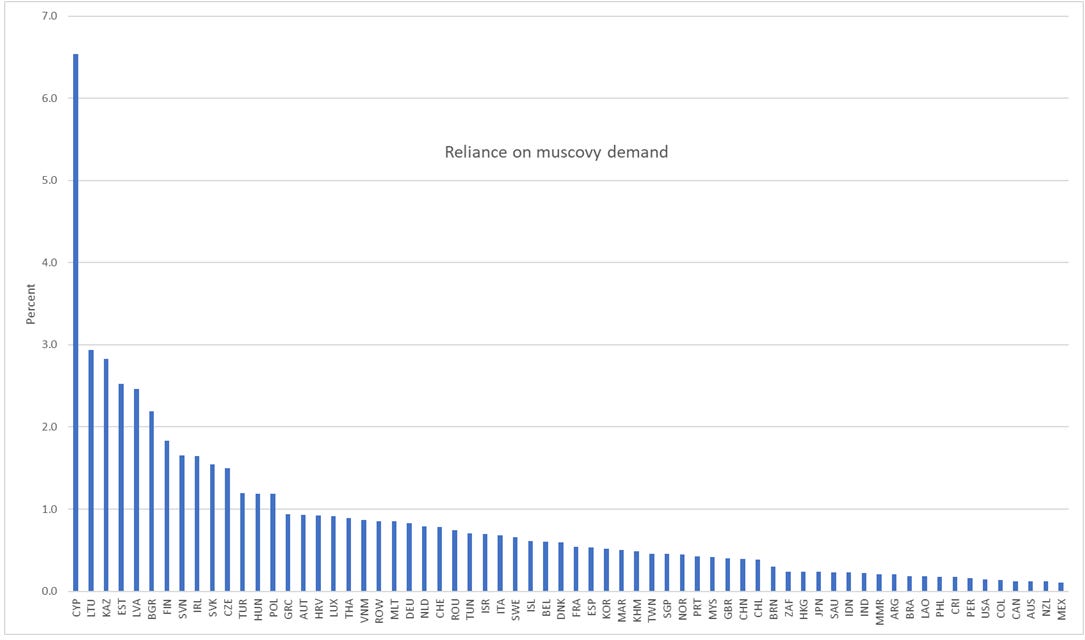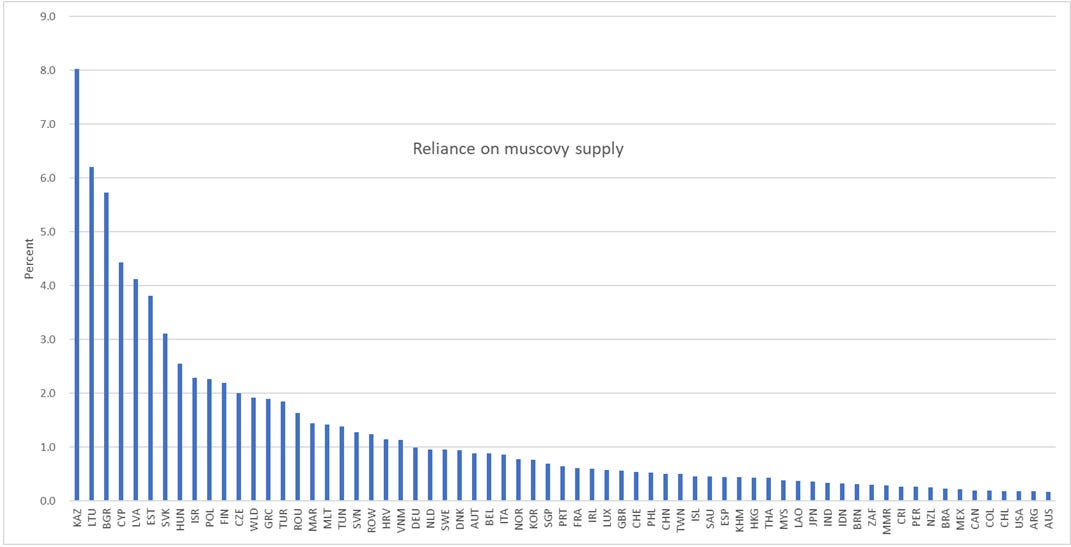Spoiler: The countries that used to be most reliant on muscovy’s energy are now decoupling from it. The countries which did not buy a lot of energy from muscovy in the past, did not buy anything else either. Decoupling from muscovy incurs very small costs for most countries. And muscovy have nothing else to offer unless you need Wagnerites to murder, rape, and torture your own people.
muscovy just doesn’t matter in economic terms for most countries in the world.
More and more steps are taken to isolate muscocy. Apart from energy, muscovy doesn’t have a lot to offer other countries. But, as energy revenues are used to murder, rape, and bomb Ukrainians, measures to decouple from muscovy energy are very important. For some countries, that is. Most countries are already more or less decoupled from muscovy.
Yesterday, an initiative to isolate muscovy was reached. Canada, Japan, France, the UK and the US will leverage the respective resources and capabilities of each country’s civil nuclear power sectors to undermine Russia’s grip on supply chains.
From the UK government's web site
This agreement will be used as the basis for pushing Putin out of the nuclear fuel market entirely, and doing so as quickly as possible, to cut off another means for him to fund his barbaric attack on Ukraine and fundamentally leave Russia out in the cold.
This, and other measures, to isolate muscovy, are mostly undertaken by countries that used to trade a lot with muscovy, especially energy. Many countries that do not implement such measures should not mistaken as supporting muscovy. They do not have to implement such measures simply because they hardly trade with muscovy.
Trade
This post will be about trade. One could also look at FDI to and from muscovy. That only confirms the picture of muscovy being close to irrelevant. As pointed out by the 2022 UNCTAD World Investment Report, most FDI stocks are held by MNEs in countries that have imposed sanctions on muscovy. China and India account for less than one percent of the total FDI stock in muscovy.
Country X’s dependence on trade with muscovy can be analysed by measuring the importance of muscovy demand and supply for country X. Beginning with the demand side, muscovy import products from country X to satisfy its domestic final demand (consumption + investments) and to satisfy final demand in third countries. In the latter case, muscovy’s exports contain intermediate products from country X. The total value of this can be calculated to show, in percentage terms, how important muscovy demand is for country X’s GDP.
Next, the supply side. Country X’s dependence on muscovy supply is calculating by flipping the coin. Country X needs products to satisfy domestic final demand in X and in third countries. For the latter case, it needs muscovy intermediate products. The value added of muscovy’s products are related to the value of total domestic final demand in X and the value of total final demand in third countries for products from country X.
Dependence on muscovy demand.
The calculations below are based on OECD’s Trade in value added database. The database ranges from 1995 to 2018.
In 2018, final domestic muscovy occupied (pun intended) a relatively large share in only one country, Cyprus. If one goes beyond the aggregate, and look at individual industries one finds that most of that is due to Cypriotic Financial Services, most likely due to laundering of muscovy money.
Value added generated by muscovy final demand as shares in GDP for different countries 2018(%).
Source: OECD database. Trade in value added indicators. Note: the information in the figure is based on “Indicators based on the origins of Value Added in Final Demand” https://www.oecd.org/sti/ind/measuring-trade-in-value-added.htm. Indicators FFD_DVA and VALU.
On average, muscovy domestic final demand only account for around 0.9% of GDP in countries. And, which is more bad news for the little person in the kremlin, muscovy shares were larger in countries that are now sanctioning and severing trade ties with muscovy. The only non-sanctioning countries where domestic final demand in muscovy accounted for more than one percent of GDP, was Kazakhstan, Thailand, Türkiye, and Vietnam. In the aggregate Rest of the World, (ROW), 0.85% of GDP was generated as a result of the muscovy markets. That aggregate includes a lot of countries including neighbours as Belarus, Kyrgizistan, Uzbekistan, and Mongolia.
This means that decoupling from muscovy is easy and cheap.
The graphs also confirms that BRICS is just an acronym. muscovy final demand only accounts for 0.4% of Chinese GDP and 0.2% of Brazilian, Indian, and South African GDP.
Dependence on muscovy supply.
Dependence on muscovy supply equals dependence on muscovy energy. In 2018, Kazakhstan was the most dependent country, where muscovy value added shares amounted to 8% of domestic final demand. Other large shares were held in countries that now are decopling from muscovy energy to satisfy domestic final demand.
muscovy shares in final domestic demand in different countries 2018(%).
Source: OECD database. Trade in value added indicators. Note: the information in the figure is based on “Indicators based on the origins of Value Added in Final Demand” https://www.oecd.org/sti/ind/measuring-trade-in-value-added.htm. Indicators FFD_DVA and VALU.
Apart from Kazakhstan, Israel was the only country where muscovy shares in domestic final demand exceeded the world average. Highest muscovy shares, and dependency, were found in countries that now are decoupling from muscovy. And, muscovy is not important for Brazil, China, India, or South Africa.
More evidence showing that decoupling from muscovy is easy and cheap.
But muscovy’s products, i.e mostly energy, can also be used to satisfy final demand in third countries by a certain country X. Even if exports from countries are normally expressed in gross terms, the OECD database allows for calculating the value added content of such gross exports. The value added content of country X’s gross exports can further be distributed across different sources (countries).
This operation results in the graph below where the pattern of countries is very similar to the two graphs above. The highest muscovy shares, and dependencies, are found for exports from countries that now are decoupling from muscovy. We only find higher that average shares for three non-sanctioning countries: Kazakhstan, Israel, and Türkiye.
muscovy value-added content shares in other countries’ exports in 2018 (%).
Source: OECD database. Trade in value added indicators https://www.oecd.org/sti/ind/measuring-trade-in-value-added.htm.
So, further evidence showing that decoupling from muscovy is easy and cheap.
And again, muscovy’s irrelevance for Brazil, China, India, and South Africa is confirmed. muscovy value added share amounted to only 0.7% of Chinese gross exports and 0.4% of the other three countries’ gross exports.
Unless you are a poor country importing grain.
In this case, muscovy’s weaponizing of food by its blockade of Ukrainian ports made a lot people in the Global South poorer as I wrote in this post.
Putin makes the world poorer.
Spoiler: Putin’s war against Ukraine has led to decreased supplies of several goods which Ukraine and Russia exports. We have already seen price hikes of oil and gas followed by decreased supply and higher prices of wheat, sunflower oil, fertilizers, steel to mention some of the most important goods. The world will be poorer, and the poorest people wil…
The UN agreement allowing Ukrainian grain to leave its ports and be exported is of course a farce, emphasing how useless the UN is.
Conclusion, muscovy doesn’t matter.
Unless you’re a dictator who doesn’t care about Wagnerites murdering, raping and torturing your own people.
In the Central African Republic
Russian mercenaries from the Wagner group, a private military contractor, have committed human rights abuses in the Central African Republic while fighting alongside government forces, according to a group of independent UN experts.
The UN working group said it was “deeply disturbed” by the connections between Russian mercenaries and a series of violent attacks that have taken place in the CAR since elections in December.
The alleged violations include mass summary executions, arbitrary detention, torture during interrogation and the forced displacement of the civilian population, about 240,000 of whom have fled their homes because of fighting in recent weeks. There were increased attacks on humanitarian organisations, as well as forced disappearances, the UN expert group said.







